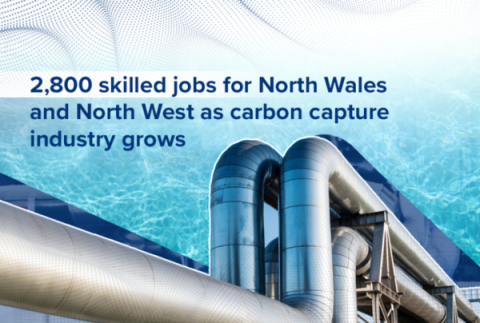2,800 skilled jobs in Wales and North West as CCUS industry grows
More good jobs unlocked for workers across North Wales and North West England as Britain’s carbon capture industry goes from strength to strength.
This will support a total of 2,800 direct, skilled jobs in total – such as engineers and construction workers – and unlock growth and investment right across the HyNet network, which spans Cheshire and Flintshire.
New pipelines and manufacturing facilities will be constructed, and existing power plants will be repurposed to capture carbon emissions and store them safely under the seabed, reducing greenhouse gas emissions and tackling the climate crisis.
Carbon capture and storage forms part of the government’s modern Industrial Strategy and will help to cleanly power heavy industry in the years to come. It is expected to support up to 50,000 good jobs as the industry develops into the 2030s, reigniting the UK’s industrial heartlands and delivering on the government’s Plan for Change.
Industry Minister Sarah Jones said: "We are securing the jobs of the future, the power for our homes and the protection of our planet by becoming world leaders on carbon capture and storage. These new projects will bring industrial renewal, unlock growth and secure an additional 800 good, skilled jobs for local people across North Wales and the North West – taking the total supported by HyNet to 2,800 – all part of our Plan for Change."
Secretary of State for Wales Jo Stevens said: "This is another significant moment for the growing clean energy industry in Wales. We are making the UK a clean energy superpower and delivering the well-paid, highly-skilled jobs of the future in the process. It’s fantastic to see North Wales at the forefront of the carbon capture industry and the hundreds of new jobs being created by the HyNet project will help drive regional growth as well as accelerating our drive towards lower bills and energy security."
The 2 projects being prioritised to join the network are:
- Connah’s Quay Low Carbon Power project in North Wales – a new power station with carbon capture and storage that at peak output is expected to produce enough clean energy to power the equivalent of 900,000 homes, whilst capturing CO2 emissions. Low-carbon power provides essential backup for a clean power system when wind and solar generation is low, delivering energy security for families and businesses.
- Ince Bioenergy with Carbon Capture and Storage (InBECCS) in Cheshire – the project will use waste wood to generate low-carbon energy and capture CO2 emissions. It will be the first carbon capture enabled greenhouse gas removals project in the UK, creating a new major infrastructure sector in the North West with high-quality jobs.
Five projects are also being lined up as standby projects with potential to connect to the network should space become available. These include hydrogen production, energy from waste and direct air capture greenhouse gas removal projects. In July government announced its commitment to an integrated regional hydrogen network. This is a key part of government’s Clean Energy Superpower and Growth missions. Decisions regarding hydrogen production to support the regional network will be aligned with the process for selecting hydrogen transport and storage projects.
Launching new negotiations with industry shows progress on the government’s £21.7 billion commitment to Britain’s carbon capture industry, with £9.4 billion committed over this parliament as part of June’s Spending Review. Carbon capture is expected to add around £5 billion per year to the UK economy by 2050.
Since last July, the government has worked at pace to get Britain’s carbon capture industry up and running after years of delays. Financial close on the HyNet cluster and the East Coast cluster in Teesside was reached in less than a year, and the government is also supporting the Acorn and Viking projects in Scotland and the Humber respectively with development funding.
Carbon capture will help to decarbonise heavy industry as the country accelerates to net zero, whilst protecting skilled, manufacturing jobs and creating new export opportunities for British business in new technologies.







